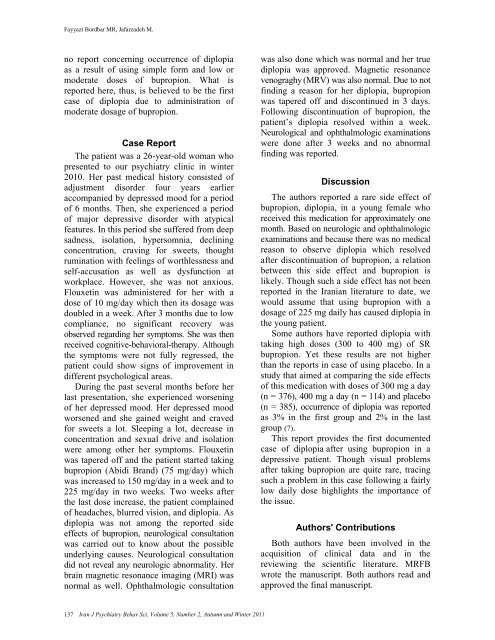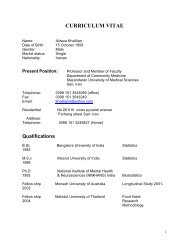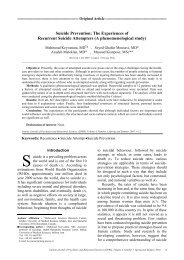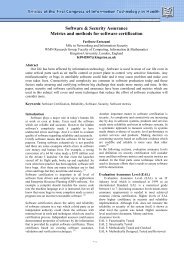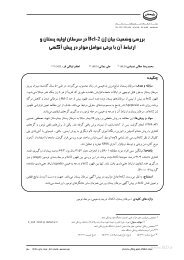Bupropion-Induced Diplopia in an Iranian Patient
Bupropion-Induced Diplopia in an Iranian Patient
Bupropion-Induced Diplopia in an Iranian Patient
You also want an ePaper? Increase the reach of your titles
YUMPU automatically turns print PDFs into web optimized ePapers that Google loves.
Fayyazi Bordbar MR, Jafarzadeh M.<br />
no report concern<strong>in</strong>g occurrence of diplopia<br />
as a result of us<strong>in</strong>g simple form <strong>an</strong>d low or<br />
moderate doses of bupropion. What is<br />
reported here, thus, is believed to be the first<br />
case of diplopia due to adm<strong>in</strong>istration of<br />
moderate dosage of bupropion.<br />
Case Report<br />
The patient was a 26-year-old wom<strong>an</strong> who<br />
presented to our psychiatry cl<strong>in</strong>ic <strong>in</strong> w<strong>in</strong>ter<br />
2010. Her past medical history consisted of<br />
adjustment disorder four years earlier<br />
accomp<strong>an</strong>ied by depressed mood for a period<br />
of 6 months. Then, she experienced a period<br />
of major depressive disorder with atypical<br />
features. In this period she suffered from deep<br />
sadness, isolation, hypersomnia, decl<strong>in</strong><strong>in</strong>g<br />
concentration, crav<strong>in</strong>g for sweets, thought<br />
rum<strong>in</strong>ation with feel<strong>in</strong>gs of worthlessness <strong>an</strong>d<br />
self-accusation as well as dysfunction at<br />
workplace. However, she was not <strong>an</strong>xious.<br />
Flouxet<strong>in</strong> was adm<strong>in</strong>istered for her with a<br />
dose of 10 mg/day which then its dosage was<br />
doubled <strong>in</strong> a week. After 3 months due to low<br />
compli<strong>an</strong>ce, no signific<strong>an</strong>t recovery was<br />
observed regard<strong>in</strong>g her symptoms. She was then<br />
received cognitive-behavioral-therapy. Although<br />
the symptoms were not fully regressed, the<br />
patient could show signs of improvement <strong>in</strong><br />
different psychological areas.<br />
Dur<strong>in</strong>g the past several months before her<br />
last presentation, she experienced worsen<strong>in</strong>g<br />
of her depressed mood. Her depressed mood<br />
worsened <strong>an</strong>d she ga<strong>in</strong>ed weight <strong>an</strong>d craved<br />
for sweets a lot. Sleep<strong>in</strong>g a lot, decrease <strong>in</strong><br />
concentration <strong>an</strong>d sexual drive <strong>an</strong>d isolation<br />
were among other her symptoms. Flouxet<strong>in</strong><br />
was tapered off <strong>an</strong>d the patient started tak<strong>in</strong>g<br />
bupropion (Abidi Br<strong>an</strong>d) (75 mg/day) which<br />
was <strong>in</strong>creased to 150 mg/day <strong>in</strong> a week <strong>an</strong>d to<br />
225 mg/day <strong>in</strong> two weeks. Two weeks after<br />
the last dose <strong>in</strong>crease, the patient compla<strong>in</strong>ed<br />
of headaches, blurred vision, <strong>an</strong>d diplopia. As<br />
diplopia was not among the reported side<br />
effects of bupropion, neurological consultation<br />
was carried out to know about the possible<br />
underly<strong>in</strong>g causes. Neurological consultation<br />
did not reveal <strong>an</strong>y neurologic abnormality. Her<br />
bra<strong>in</strong> magnetic reson<strong>an</strong>ce imag<strong>in</strong>g (MRI) was<br />
normal as well. Ophthalmologic consultation<br />
was also done which was normal <strong>an</strong>d her true<br />
diplopia was approved. Magnetic reson<strong>an</strong>ce<br />
venograghy (MRV) was also normal. Due to not<br />
f<strong>in</strong>d<strong>in</strong>g a reason for her diplopia, bupropion<br />
was tapered off <strong>an</strong>d discont<strong>in</strong>ued <strong>in</strong> 3 days.<br />
Follow<strong>in</strong>g discont<strong>in</strong>uation of bupropion, the<br />
patient’s diplopia resolved with<strong>in</strong> a week.<br />
Neurological <strong>an</strong>d ophthalmologic exam<strong>in</strong>ations<br />
were done after 3 weeks <strong>an</strong>d no abnormal<br />
f<strong>in</strong>d<strong>in</strong>g was reported.<br />
Discussion<br />
The authors reported a rare side effect of<br />
bupropion, diplopia, <strong>in</strong> a young female who<br />
received this medication for approximately one<br />
month. Based on neurologic <strong>an</strong>d ophthalmologic<br />
exam<strong>in</strong>ations <strong>an</strong>d because there was no medical<br />
reason to observe diplopia which resolved<br />
after discont<strong>in</strong>uation of bupropion, a relation<br />
between this side effect <strong>an</strong>d bupropion is<br />
likely. Though such a side effect has not been<br />
reported <strong>in</strong> the Ir<strong>an</strong>i<strong>an</strong> literature to date, we<br />
would assume that us<strong>in</strong>g bupropion with a<br />
dosage of 225 mg daily has caused diplopia <strong>in</strong><br />
the young patient.<br />
Some authors have reported diplopia with<br />
tak<strong>in</strong>g high doses (300 to 400 mg) of SR<br />
bupropion. Yet these results are not higher<br />
th<strong>an</strong> the reports <strong>in</strong> case of us<strong>in</strong>g placebo. In a<br />
study that aimed at compar<strong>in</strong>g the side effects<br />
of this medication with doses of 300 mg a day<br />
(n = 376), 400 mg a day (n = 114) <strong>an</strong>d placebo<br />
(n = 385), occurrence of diplopia was reported<br />
as 3% <strong>in</strong> the first group <strong>an</strong>d 2% <strong>in</strong> the last<br />
group (7).<br />
This report provides the first documented<br />
case of diplopia after us<strong>in</strong>g bupropion <strong>in</strong> a<br />
depressive patient. Though visual problems<br />
after tak<strong>in</strong>g bupropion are quite rare, trac<strong>in</strong>g<br />
such a problem <strong>in</strong> this case follow<strong>in</strong>g a fairly<br />
low daily dose highlights the import<strong>an</strong>ce of<br />
the issue.<br />
Authors' Contributions<br />
Both authors have been <strong>in</strong>volved <strong>in</strong> the<br />
acquisition of cl<strong>in</strong>ical data <strong>an</strong>d <strong>in</strong> the<br />
review<strong>in</strong>g the scientific literature. MRFB<br />
wrote the m<strong>an</strong>uscript. Both authors read <strong>an</strong>d<br />
approved the f<strong>in</strong>al m<strong>an</strong>uscript.<br />
137<br />
Ir<strong>an</strong> J Psychiatry Behav Sci, Volume 5, Number 2, Autumn <strong>an</strong>d W<strong>in</strong>ter 2011


